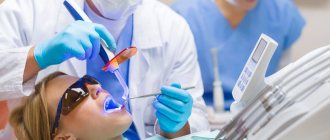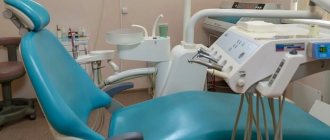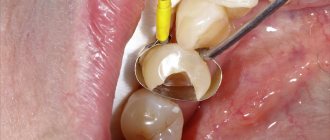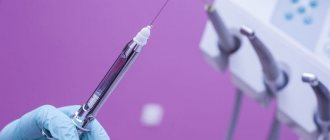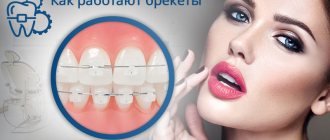What is therapeutic dentistry?
There are many different areas of dental practice. Therapeutic dentistry is a fundamental area whose objectives are to treat diseases of the teeth and periodontal tissues.
Services provided by therapeutic dentistry:
- treatment of dental caries and any of its complications (pulpitis, periodontitis);
- treatment of gum inflammation (gingivitis, periodontitis);
- treatment of non-carious enamel lesions (fluorosis, hypoplasia, erosion);
- treatment and restoration of teeth after injury;
- elimination of birth defects of shape or color.
The methods of modern therapeutic dentistry are aimed at preserving teeth and eliminating factors that can lead to its destruction.
What can a doctor do?
The task of therapeutic dentistry is the timely elimination of the pathological process when it is detected, the prevention of tooth decay, and the maximum possible extension of its life. For example, if caries is detected in the initial stage, tooth treatment will make it possible to preserve the pulp intact. If chips or cracks appear in the enamel, the dentist will restore its integrity using modern filling materials. In case of deep damage due to the carious process, the dentist will provide pain relief, clean the canals, and place a filling. In advanced cases, not one, but several visits to the doctor may be required, during which the necessary additional assistance will be provided (washing, anti-inflammatory therapy, etc.).
Therapeutic dentistry provides treatment for patients with periodontal disease. Innovative methods make it possible to eliminate problems such as inflammation, cysts, and stone deposits without pain. In addition, by contacting the clinic, the patient can count on help with a wedge-shaped defect, increased enamel abrasion and other diseases.
What does a dental therapist do?
Within the competence of a dentist-therapist is the treatment of major dental diseases. A dental therapist does the following:
- conducts an initial consultation;
- performs an examination and, if necessary, refers the patient to hardware diagnostics (X-ray, orthopantomogram, CT);
- makes a diagnosis;
- draws up a treatment plan;
- provides treatment for caries and other dental diseases;
- performs fillings and direct restoration of teeth;
- carries out professional oral hygiene;
- eliminates cosmetic defects of teeth, carries out whitening procedures in dentistry;
- carries out other preventive procedures (remineralization, fluoridation, etc.)
As a rule, a dental therapist also specializes in endodontic treatment, and performs cleaning and root canal treatment.
What dental diseases does a dentist treat?
The main task of a dentist-therapist is the prevention and treatment of oral diseases. Most often, treatment in therapeutic dentistry is associated with caries. This disease has several types, stages and symptoms. Usually the disease begins with damage to the enamel. There can be many reasons: mechanical stress, poor hygiene, thermal irritants, excessive consumption of sweets, and so on. Only timely treatment will help save a tooth with caries. In advanced stages, the tooth will have to be depulped (nerve removal).
Dental therapists help not only patients with caries. A doctor’s qualifications are sufficient to treat the following diseases:
- pulpitis;
- periodontitis;
- dental injuries (dislocations, fractures, bruises);
- congenital anomalies of shape and color;
- non-carious diseases: hypoplasia, erosion and fluorosis of enamel, wedge-shaped defect, pathological abrasion, hyperesthesia.
Modern methods of therapeutic treatment in dentistry
Therapeutic treatment in dentistry includes a whole range of procedures, including diagnostics, filling, and removal of dental plaque on the teeth. For any problem, modern dentistry has several solutions.
Diagnostics in therapeutic dentistry
When a simple visual examination of the oral cavity is not enough to accurately make a diagnosis, identify the source of inflammation, or assess the nature of the pathology, the dentist-therapist prescribes hardware dental diagnostics to the patient.
The following types of hardware diagnostics are used in therapeutic dentistry:
- targeted x-ray – pinpoint identification and confirmation of the problem, monitoring treatment results;
- orthopantomogram - a panoramic image, effective in studying difficult-to-diagnose cervical caries, with multiple caries, gives an idea of the condition of all teeth of both jaws;
- CT is a method that provides the most detailed display of the condition of the teeth, the structural features of the root canals, the condition of the periodontal tissues, bite, and helps to identify any pathologies of the dental system.
Dental treatment
The most common dental disease that a dentist has to deal with is caries. The cause of caries can be poor hygiene, internal diseases, mineral deficiency in the body and many other factors. The danger of caries is that up to a certain point it develops without obvious symptoms, and it can only be detected during a dental examination, where the doctor uses a special instrument.
Therapeutic dentistry today can offer patients the most effective methods of treating and preventing infection. Traditional treatment of caries is carried out in several stages:
- 1
Examination, pathology analysis, assessment of the size of the carious cavity, drawing up a treatment plan. - 2
According to indications (in case of hypersensitivity, deep cavity), the doctor applies local anesthesia.
- 3
Preparing the tooth, removing infected dentin, forming a cavity and preparing it for filling.
- 4
Filling (restoration).
- 5
Final processing of the restoration (giving an anatomically correct shape, occlusion control, polishing).
In case of complications (pulpitis), cleaning, sterilization, treatment and sealing of the root canals are also carried out.
In addition to traditional filling, there is also a method of non-invasive treatment of caries at the initial stage (when the infection has affected only the surface enamel layer of the tooth) - ICON. This method is absolutely painless, is successfully used in adult and pediatric dentistry, and allows treatment without damaging healthy tooth tissue.
Gum treatment
Treatment of gums in a therapeutic dentistry office is carried out with a slight development of the inflammatory process and involves the following measures:
- removal of dental plaque, professional oral hygiene;
- elimination of factors that create favorable conditions for the development of infection in gingival tissues - treatment of caries, replacement of old restorations;
- treatment of inflamed tissues with special antibacterial agents (applications, application of medicinal gels);
- prescribing a course of drug therapy;
- consultation on home oral hygiene, prevention of gingivitis.
In case of serious damage to the gums (development of periodontitis, formation of periodontal pockets, tooth mobility, etc.), treatment is carried out by specialists from other branches of dentistry - a periodontist, a dental surgeon.
Prevention
The main cause of dental and gum disease in patients is dental plaque and tartar. Therefore, one of the best methods for preventing caries and gingivitis is professional oral hygiene in dentistry.
If there is a high predisposition to the development of caries (weak enamel), before orthodontic treatment, as a preventative measure, the doctor may prescribe the patient enamel remineralization (nutrition with minerals, strengthening of hard tissues, protection from destruction by infection).
Teeth whitening
Professional whitening effectively removes unaesthetic pigments of yellow, gray, brown shades on teeth. Modern technologies make it possible to carry out whitening without pain, without the risk of damaging the enamel.
Possible complications
A large amount of information about caries lulls one's vigilance, and it no longer seems so scary, and complications are usually learned only when they unexpectedly make themselves known.
One of these “surprises” is pulpitis - a complex disease in which the pulp, in other words, the nerve, becomes inflamed, and, what is typical for this type of disease, it makes itself felt at night, when you least want to go to the doctor, and Most doctors no longer work.
In the morning, the pain subsides and there is a firm belief that the problem has been solved by itself, many even forget about it, but night comes again and brings with it pain and insomnia.
Painkiller tablets provide only slight relief. And this is repeated night after night, and only the most persistent endure to the last; on the third or fourth day, usually people already go to the doctor. Treatment at this stage is complex, but not to the same extent as if a person were to delay the visit for two to four weeks, because at this point the complications become more chronic, bringing with them a set of adverse consequences.
Also, one of the varieties of the problematic train of caries is periodontitis - an inflammatory process in the periapical tissues. These and a number of other diseases are dealt with by a specialist in the therapeutic department of dentistry.
Medicine has been developing recently at a stunning speed, and therapeutic dentistry does not stand still, especially in Moscow, which is the capital and where the best of the best specialists go to study. The latest technological innovations and scientific developments have helped turn frightening sessions at the dentist into a comfortable pastime. Today, the challenges facing dentistry have specific solutions. Our therapeutic dentistry invites you to conduct a competent diagnosis and, if necessary, undergo a course of treatment. You have at your disposal all the necessary equipment for all types of treatment and quality control.
The goal of every therapeutic dentistry specialist is to save the tooth and prevent its removal. If he sees that the tooth can still be saved, then he will do everything possible and impossible to make it last as long as possible. And remember: the sooner you identify caries, the easier it will be to get rid of it. In almost 99.9% of cases, caries gives complications that lead to more severe forms of the disease. Every year this disease affects more and more people.
Principles of therapeutic dental treatment at the Amel Dental clinic
- safety of all procedures;
- treatment without pain and without complications;
- desire to preserve teeth;
- the use of the most gentle treatment methods to minimize intervention and prolong the life of teeth;
- caring for the health and beauty of your smile.
Innovative technologies (modern stoma equipment, dental microscope), dental materials and medications of the highest quality help us guarantee such treatment results. We use digital technologies in diagnostics and treatment, which allows our doctors to make an accurate diagnosis, control all processes, avoid errors and guarantee patients high quality dental services.
Dental treatment at the Techno-Dent Clinic
"Techno-Dent Clinic" offers dental treatment in Moscow of varying degrees of complexity. Among our advantages:
- qualified specialists with extensive professional experience;
- modern high-precision equipment;
- the use of both traditional and innovative treatment approaches and materials;
- the ability to conduct diagnostics before, during and after dental treatment;
- individual approach to each patient;
- affordable prices for dental treatment;
- different dental specialties (if necessary, you can get additional advice from a specialist in a different profile without leaving the clinic);
- attentive and responsible attitude.
If you want to find out the price of dental treatment in Moscow or make an appointment with a specialist, this can be done in several ways:
- by contacting the clinic directly;
- by calling the phone number indicated on the website pages, as well as ordering a call back;
- by contacting a consultant for help using the feedback form.
FAQ
What is therapeutic dentistry?
This is a branch of dentistry that deals with the study, diagnosis, treatment and prevention of diseases of the teeth, tissues surrounding the tooth, and the oral mucosa.
Which doctor treats caries?
The dentist-therapist deals with the treatment of caries, as well as the treatment of non-carious lesions of teeth.
What does a dental therapist treat?
A dentist treats caries, gingivitis, non-carious damage to teeth, fills teeth, restores teeth after injury (chips, fractures), corrects cosmetic defects using direct restoration, treats diseases of the gums and mucous membranes, gives recommendations on the prevention of dental diseases and proper hygiene.
Do I need to prepare for dental treatment?
In most cases, a visit to the dentist does not require any special preparations. You just need to brush your teeth thoroughly before visiting a doctor. If there are any diseases related to contraindications, allergic reactions to medications, you can get a corresponding certificate from your therapist. If you have already had your teeth treated, but want to continue in another clinic, it is a good idea to have with you information about the procedures performed, x-rays, and the conclusions of the attending physician.
Sometimes going to the dentist is postponed for a long time due to fear. Fear of dental treatment is not uncommon. Experts recommend taking sedatives, such as valerian or motherwort extract, before visiting a doctor.

